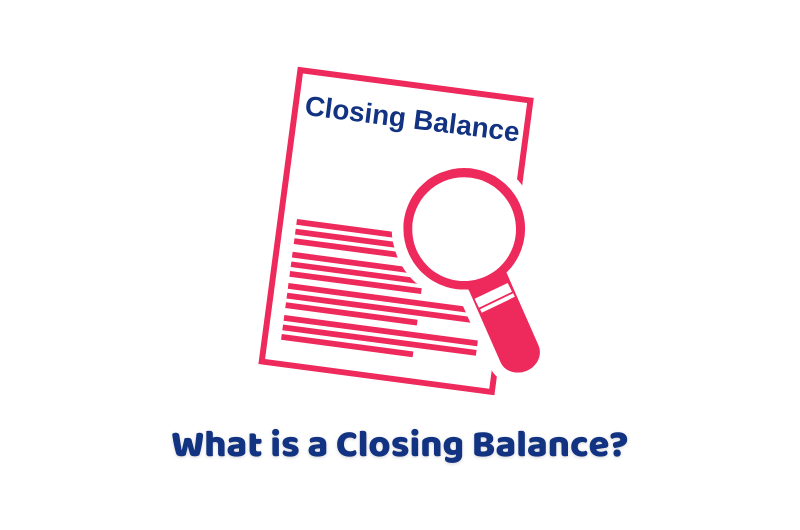At the end of a specific accounting period, the closing balance provides us with a clear snapshot of our financial position. It helps us evaluate our current financial health and make informed decisions about our money. By understanding the concept of closing balances, we can track and reconcile our accounts, create accurate financial statements, and gain insights into our overall financial stability.
AccountingFirms can assist you in managing your business and accounting problems as well as avail maximum tax relief possible.
What is a Closing Balance?
It represents the net result of all financial transactions, including incoming funds (such as credits, deposits, and revenue) and outgoing funds (such as debits, withdrawals, and expenses) throughout that period.
The closing balance is important because it provides a snapshot of the financial position at a given point in time and helps in assessing the overall financial health and stability. Understanding the closing balance ensures that individuals and organisations have a clear picture of their financial standing and aids in effective financial planning and management.
What Does Closing Balance Mean in Banking?
It represents the total funds available in the account after all deposits, withdrawals, and transactions have been processed for that day. The closing balance is important because it helps account holders track their spending, manage their finances, and reconcile their bank statements.
It serves as a starting point for the next day’s transactions and provides individuals with an up-to-date snapshot of their account balance. By keeping an eye on the closing balance, individuals can ensure they have enough funds to cover expenses, avoid overdrawing their accounts, and make informed financial decisions. It’s a handy piece of information when it comes to monitoring your financial health and staying on top of your banking affairs.
What Does Closing Balance Mean in Accounting?
It represents the net result of all financial transactions that occurred during that period, including revenues, expenses, gains, and losses. By comparing the closing balances of different accounting periods, one can analyze financial performance, track trends, identify areas of improvement, and make informed financial decisions. In summary, the closing balance in accounting plays a crucial role in assessing overall financial health and stability.
How to Calculate Your Closing Balance?
To calculate your closing balance, you need to consider the starting balance of the account, any deposits or credits made during the accounting period, and any withdrawals or debits that occurred. Start with the starting balance and add the total of all deposits or credits received during the period. Next, subtract the total of all withdrawals or debits made.
The result will be your closing balance. It’s crucial to keep track of all transactions accurately to ensure an accurate calculation. Many individuals and businesses use accounting software or online banking platforms to automatically calculate and maintain their closing balance. This way, you can easily monitor your financial position and make informed financial decisions based on your closing balance.
How to Work out the Closing Balance?
To work out your closing balance, you’ll need to take into account a few key factors. Firstly, start with the opening balance of your account for the specified period. Then, add any deposits or credits made during that time frame. These could include income, transfers, or any other funds added to the account. Next, subtract any withdrawals or debits that occurred during the period. These could be expenses, outgoing transfers, or any other funds taken out of the account.
Finally, the resulting amount will be your closing balance. Remember, accuracy is key, so make sure to properly track and record all transactions to ensure an accurate calculation. Keeping an eye on your closing balance helps you have a clear picture of your financial position and make smart financial decisions moving forward.
Why are Closing Balances Important?
Closing balances are incredibly important for multiple reasons. Firstly, they provide a snapshot of your financial position at the end of a specific accounting period. By knowing your closing balance, you can assess your current financial health and make more informed decisions about spending, saving, and investing. Additionally, closing balances help you track and reconcile your accounts, ensuring that all transactions have been accurately recorded.
They also assist in creating accurate financial statements, such as balance sheets and income statements, which are essential for evaluating business performance and making financial decisions. By monitoring your closing balance over time, you can identify trends, patterns, and areas where adjustments may be needed, helping you manage your finances effectively. Ultimately, closing balances offer valuable insights into your financial standing and aid in maintaining financial stability and growth.
The Bottom Line
So, to sum it all up, the closing balance is a crucial element in managing our finances. It gives us a snapshot of our financial position at the end of a specific period, enabling us to make informed decisions about our spending, saving, and investing. By tracking our closing balance, we can reconcile our accounts, create accurate financial statements, and identify trends and areas for adjustment. Ultimately, understanding our closing balance helps us maintain financial stability and make sound financial choices.
We are committed to delivering exceptional accounting services to our valuable clients in the UK to ensure they get the most professional solution to queries about accounting and taxation in the UK.
Disclaimer: All the information provided in this article on what is closing balance in the UK, including all the texts and graphics, is general in nature. It does not intend to disregard any of the professional advice.

